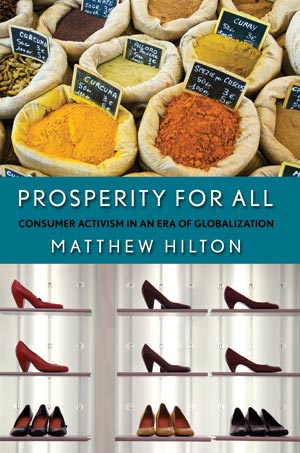
At its broadest level, Prosperity for All is about the changing meaning of consumer society over the past half century. I argue that whereas access to the benefits of consumer society for everybody dominated thinking in the mid-twentieth century, consumer society has more recently come to be about individual choice: that is, only for those who can afford to participate.
The book gets at this transformation through an examination of the aims and priorities of global consumer activism. Usually associated with best buy magazines such as Consumer Reports in the US, Which? in the UK, and Que Choisir in France, consumer activism has in fact also been associated with the needs and aspirations of the developing world. Inspired by western activists such as Ralph Nader, consumer groups have emerged in Asia, Latin America and Africa. They have been concerned not with the value for money of cars and electronic goods, but with the rights of the poor to decent food, housing, water, transport, and energy.
In doing so they remind us that consumer society is about poverty as well as luxury. For all the problems confronting affluent societies seemingly dominated by excessive and unsustainable consumption, for the majority of the world’s population, mere access to a world of goods is still a legitimate desire.
Unfortunately, debates about consumer society are rarely couched in these terms. By following the fortunes of the consumer activist movement—and the setbacks it faced from the 1980s—we can see how the dominant meanings of consumer society changed as well.
Today we rarely talk about access to consumption. Instead, we talk about choice. Whether we see unlimited choice as the triumph or tragedy of consumer society, to focus the debate on such a narrow concept cuts out other important debates once so central to the meaning of consumer society: needs, rights, entitlements, fairness, equality, sovereignty and, ultimately, the redistribution of wealth.
“For all the problems confronting affluent societies seemingly dominated by excessive and unsustainable consumption, for the majority of the world’s population, mere access to a world of goods is still a legitimate desire.”
The book is very much a product of my training as a social historian. That is, I have attempted to uncover the hopes and aspirations of ordinary groups of people. While much of social history has been concerned with the lives of the working class, I chose to examine how people think and behave as consumers: with how they spend, rather than how they earn their money.
In particular I am interested in how the everyday problems of getting and spending—dealing with faulty and dangerous goods, overcoming unscrupulous manufacturers, dealing with inequities in the marketplace, challenging the tactics and assumptions of advertisers, and so on—have translated into political agendas.
Ralph Nader provides the classic case in point. His analysis of the US motor industry demonstrated that the problem was not simply the poor design of one brand of commercial vehicle. The problem was deeper and multilayered. The reason why a consumer might be offered a dangerous motorcar was ultimately due to problems about collusion in the industry, the lack of standards, the absence of federal government regulation and the non-existence of a form of political pressure to act on behalf of the public or consumers.
Ralph Nader therefore gave rise to the public interest movement. He became the leading consumer advocate in the US, achieving a public profile such that he was even talked of as Jimmy Carter’s running mate in the 1975 Presidential election. (That Nader entered politics again a quarter-century later is another matter.)
But I also want the book to start a debate about consumer society distinct from much of the liberal critique so prevalent in the West. Think of all the popular works devoted to consumer society. They go back to Thorstein Veblen’s critique of ‘conspicuous consumption’ in his Theory of the Leisure Class. They include the classics of 1950s liberalism—Vance Packard’s Hidden Persuaders and J. K. Galbraith’s Affluent Society. The sixties counterculture gave rise to numerous attempts to seek a more meaningful existence beyond the false neon lights of commodity capitalism. They continue to this day, ranging from Naomi Klein’s No Logo to the more recent debate about ‘affluenza’.
The inadequacy of all these books is that they oversimplify so much about consumer society. Middle-class liberal guilt too readily condemns the aspirations of ordinary people eager to participate in the good life. Important economic issues about trade and finance are misunderstood such that we are expected to be for or against free trade. Significant political decisions about public intervention in the market place are reduced to a ‘nanny state’ versus libertarian individualism. But most of all, these books relate the problems of consumer society purely in terms understandable to the rich.
Consumer society is our common guilty indulgence for which we must constantly chastise ourselves. Perhaps there’s nothing wrong with that. But the focus does obscure another more important question—the question of who should get to participate in consumer society. Debates about participation were central to Roosevelt’s New Deal, to the GI Bill at the end of the Second World War, and to the establishment of welfare regimes and social market economies across Europe in the 1940s and 1950s. They would remain important too to the world’s poor. But now poverty is treated as an issue separate from consumer society. The poor don’t get to have a say in the world of affluence; instead their plight is left to structural adjustment, philanthropy and pop concerts. My point is that the poor too should be incorporated into any discussions about consumer society; poverty is not a problem distinct and external to consumer society.
Two chapters might provide some real surprises to readers.
Chapter five deals with activist networks. Today, networks are a common feature of the political landscape. Non-governmental organisations, labour unions, social movements, women groups, and faith-based organisations often come together to focus on one particular issue and campaign collectively. A particularly successful one in recent years was Jubilee 2000, to stop third world debt. The varied organisations within a network might have a whole host of political differences (think of the radical and alternative yet also reformist and even conservative advocates of climate change). Yet they are willing to cast these aside in order to focus on the issue they have in common.
What is not so well known is that the organised consumer activist movement played a crucial role in pioneering networks at the global level. In 1979 the global consumer movement launched the International Baby Food Action Network to campaign against the sale of breast milk substitutes. In 1981, Health Action International was created to campaign against the inappropriate marketing of dangerous or useless pharmaceuticals. And in 1982, Pesticide Action Network was formed to tackle the issue of extensive pesticide use and to seek alternative forms of agricultural production.
In all of these cases the consumer movement was joined by what have become more well known activist groups (e.g., Oxfam). Yet it was the consumer movement that initially inspired the networks, provided the secretariats to keep them going and the freedom to go on to become prominent players in global civil society. In doing so they provided the forms of global co-operation among NGOs that would later manifest itself at the World Social Forum.
Chapter six also explores unfamiliar but intriguing territory—the opposition faced by the consumer movement. Purchasers of Consumer Reports hardly come across as a revolutionary vanguard seeking to destroy the fundamental structures of our economy and society. Yet the opponents of consumer groups would have us believe otherwise. The original Consumers Union, founded in 1936, long provoked the ire of business groups who disliked their products being criticised. Consumers Union leaders had repeatedly to fend off charge of communism during the McCarthy era. But the wrath of big business was maintained with every success of the consumer movement. Ralph Nader was a constant thorn in their side, so much so that they—comically and disastrously—hired private investigators to ensnare him in a ‘honey trap’.
The opposition to government regulations in the consumer interest became much more serious once the global economy faced up to the challenges of the 1970s. Then, various rightwing think-tanks were either founded or revitalised through huge corporate donations. Neoconservative groups such as the Heritage Foundation and the American Enterprise Institute ensured that American citizens would never enjoy the same sort of consumer protection agencies as their European counterparts. And once Ronald Reagan was elected to power, the anti-consumer, anti-regulatory agenda dominated foreign policy too. The various attempts to control multinational corporations’ less responsible actions that the consumer movement had inspired were rolled back and a new system of global trade regulation was eventually put in place (i.e., the World Trade Organisation) that gave little room to the concerns of consumer activism.
“We must see consumer society as a political subject that affects us all; not simply a moral dilemma facing those who pretend they’d like to downsize.”
I hope that the book will inspire a broader debate about the meaning of consumer society. Since the credit crunch, the liberal guilt complex has become more prominent. Affluent commentators, concerned about their own luxurious lifestyles, have seemed to welcome the contractions in the economy as some sort of cure for western affluenza. This is such a shame, especially since many of those who are concerned with western over-consumption are also worried about global poverty. But the approaches to poverty are now dominated by philanthropy rather than politics.
I hope Prosperity for All will help reintegrate debates about poverty with debates about under-consumption. That is, we recognise the poor around the world have legitimate desires to share in a life of plenty and that there is much to recommend the world of goods. Yet we must see consumer society as a political subject that affects us all; not simply a moral dilemma facing those who pretend they’d like to downsize.
We need to consider how wealth might be better distributed around the world so that we can all be consumers – perhaps not consumers who all drive Hummers, but consumer who all have access to a decent standard of living.


Matthew Hilton is Professor of Social History at the University of Birmingham, UK. He has published over 50 books and articles on the history, culture and politics of consumption. His publications include Smoking in British Popular Culture (2000), Consumerism in Twentieth-Century Britain (2003), as well as Prosperity for All (2009). He is currently directing a project examining the history of non-governmental organisations (NGOs) especially those working in the fields of homelessness, the environment and international aid and development.